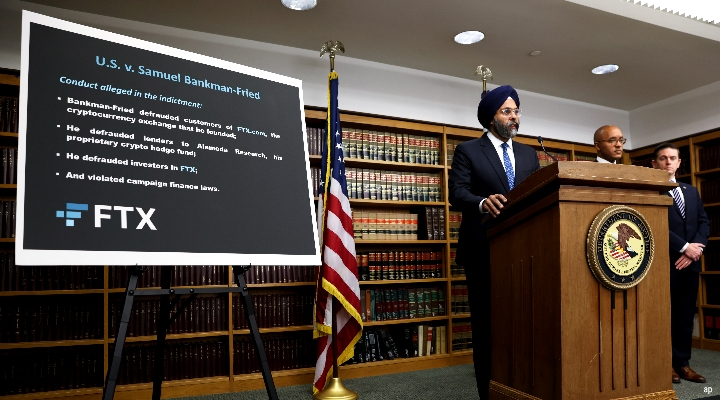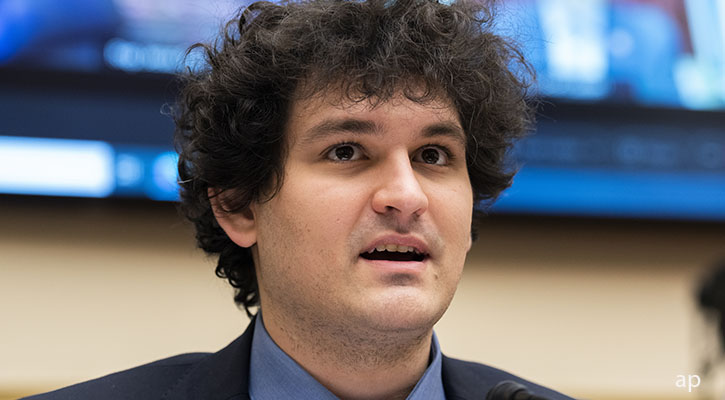
It’s a Bleak Midwinter for Retailers
Latest figures show it' already a nightmare before Christmas for shops on the high street and online retailers. Black Friday discounts failed to provide the usual lift to the sector, with retail sales for November falling by 0.4%, according to the Office for National Statistics. The drop was particularly marked for online retailers. Economists had predicted a small rise this month, with consumers buying early to spread the cost of Christmas amid a serious cost-of-living squeeze, so this fall suggests a more severe economic downturn could be on the way. These figures don’t yet factor in the effect of the prolonged cold freeze and widespread disruption caused by postal and train strikes — both of which are likely to reduce footfall in shops and cause a further decline in online spending.
One Man Thinks FTX's Collapse Wasn't Complex
Cryptocurrency might be the 21st Century’s most complex investment craze, but there is something all-too-familiar about the collapse of one of its biggest companies FTX. FTX's new CEO John Ray III, who was brought in to find out what was going on at the firm, told a gobsmacked House of Representatives Committee that alleged fraud at the business "[wasn’t] sophisticated whatsoever. This is just plain old embezzlement. Old school." Meanwhile after several weeks of media interviews, founder Sam Bankman-Fried is now facing a tougher round of questions after being arrested in the Bahamas. The 30-year old, who until recently was worth an estimated £16 billion, is accused of a "brazen multi-year mass financial fraud". He could face up to 115 years in jail if convicted.
There's More Crypto Havoc to Come
It's clear the implosion of FTX is casing significant problems for other cryptocurrency firms, with investors withdrawing funds en mass, and sentiment collapsing. This week, crypto exchange Binance said it registered $1.9bn of withdrawals in the space of just 24 hours, causing it to "temporarily pause" withdrawals of one of its cryptocurrencies, although trading later resumed. The company has sought to reassure the market that it has sufficient reserve to meet withdrawals, publishing an independent auditor's report. Meanwhile, Bitcoin miner Argo Blockchain warned it needed to find additional funds if it was to avoid bankruptcy with the next month. The company is now looking to sell assets to raise funds. This has caused some observers to comment that perhaps it should just step up its mining operations, although perhaps, when the chips are down, there’s much to be said for hard cash.
Elon Ain't The World's Richest Man
The controversial new owner of Twitter, Elon Musk — who this week suspended the accounts of several critical journalists — is no longer the world’s richest man. The mantle has been taken by Bernard Arnault, chief executive of the French-based luxury goods group LVMH. Musk’s net worth has slipped following a significant fall in the share price of his electric car company Tesla. Despite all the focus on Twitter, Musk remains CEO at Tesla and is still the largest shareholder. According to Forbes, Musk is now worth around $178bn (£152bn) while thanks to the rising value of LVMH shares, Arnault is worth $188bn. Given LVMH owns champagne house Moet, along with iconic fashion brand Louis Vuitton, Arnault will no doubt be toasting his success in style.
TUI Looks Sunnier
Holiday firms look to be back in business. Profits at TUI — Europe’s largest travel group — bounced back after the Covid-19 pandemic, with strong holiday sales this summer and bookings up over the winter period. Profitability has been helped by higher prices, with TUI revealing the cost of a winter break is 28% higher than pre-Covid-19. No doubt the current cold snap is making a winter sun trip to the Canaries look even more attractive, despite the higher price tag. However, share prices dipped after TUI said it was looking to raise capital amid ongoing pressures of higher fuel prices, and some customers cutting back on holiday spending amid the cost-of-living squeeze.
EasyJet's Boss is Banking a Bonus
Budget airline easyJet (EZJ) is not yet back in the black after Covid-19, racking up losses of £208m in 2022 after it suffered staffing problems and had to cancel thousands of flights this summer. But despite these problems its chief executive Johan Lundgren received a £1.2m bonus on top of his salary and a share pay out. In total this represents a 272% pay rise from 2021, when no bonus was paid due to the pandemic. While this may prompt criticism of boardroom pay excess, easyJet also pointed out that 94% of their staff also received bonus payments — including a £1,000 payment to crew to help with cost-of-living increases. The airline's renumeration committee said it recognised calls for restraint, but pointed out that Lundgren had (surprisingly) hit "customer satisfaction targets", partly by achieving a 2.5% reduction in cancellations.
Microsoft Has Bought into LSE
Microsoft is buying a 4% stake in the London Stock Exchange (LSE), worth an estimated £1.5bn ($1.8bn) The tech giant is buying in after the London Stock Exchange Group agreed a partnership that effectively commits it to spending at least £2.3bn on Microsoft’s cloud services over the next decade. Some commentators say this doesn’t look particularly attractive, given that LSE is already a Microsoft customer. But Microsoft has said it hopes the stock exchange will spend as much as $5bn on their services. This deal helps cement the LSE’s position as an analytics provider, after it previously bought Refinitiv.
Octopus Has Got Its Tentacles on Guardian Angel
Other companies were also heading off into new unexpected territory this week. Octopus Group, the privately-owned owner of Octopus Energy, has purchased a majority stake in Guardian Angel, a company offering a range of funeral planning, will-writing and associated services. Octopus describes this as moving into the "death business" — a business that is certainly never going away. Guardian Angel was set up in 2017 after the founder’s mother was killed in a car accident, and he realised how little support was available. The company aims to encourage people to put financial affairs in order during their lifetime, and remove some of the taboos around talking about bereveament.
The Challenger Banks Are in The Spotlight
We are used to seeing the regulator hand out fines to banks — with HSBC and Santander both recently under scrutiny. This week it was the turn of the challengers. Metro Bank has been hit with a £10m fine for misleading investors, and two of its former senior executives have also been handed individual fines. The action follows accounting issues where it misreported to investors the assets used to calculate the capital it needed to hold. When details were uncovered it prompted a huge drop in the bank’s share price, which Metro Bank has struggled to recover from. In 2018 Metro Bank’s share were trading at £40 a share, today there are priced at around 109p — a slight recovery on the previous low of 60p.
More Prizes Are up For Grabs on Premium Bonds
Some good news for Christmas. National Savings & Investment (NS&I) is upping the prize "rate" on Premium Bonds from 2.2% to 3% — in response to rising interest rates, although this won’t come into effect until the January draw. While the odds of winning any prize remain the same, NS&I will be awarding more big prizes, with 56 prizes worth £100,000 in January (up from just 18); 112 prizes of £50,000 (up from 36) and 223 prizes of £25,000 (up from just 76). At the time of writing this 3% savings "rate" beats the best savings rates on the market — although some banks will be pushing up savings rates following this week’s interest rate rise. But it is worth noting that while all those with a Buckinghamshire Building Society account will get the advertised 2.9% return on their money, many, many Premium Bond holders will have less than "average luck" and so get a lower return.




























